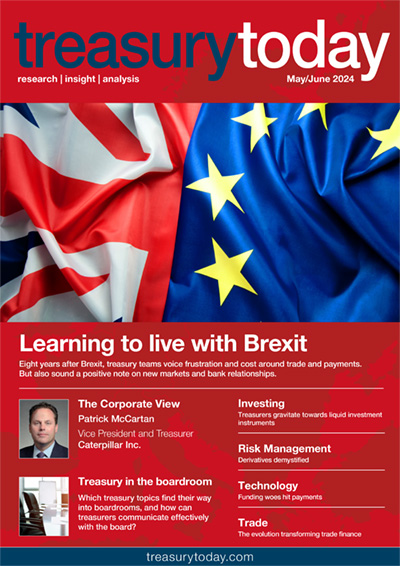Contents
- Editorial
- Risk and resilience
- Insight & Analysis
- Learning to live with Brexit
- Investing
- Treasurers value money market fund certainty
- Treasury Talent
- Treasury in the boardroom
- The Corporate View
- Patrick McCartan, Caterpillar Inc.
- Trade
- How ABB Group digitised its export trade finance function
- Technology
- Funding woes impact payments innovation
- Risk Management
- Derivatives demystified
- Question Answered
- Setting up a TMS
- Market View
- Has the risk of recession disappeared?
Editorial
Risk and resilience
Treasury Today goes to press as geopolitical risk spikes even higher following the escalation of the conflict in the Middle East. It is at times like this, as ground war continues to rage in Europe, that cooperation and pulling together to protect our common interests becomes more important than ever. Against this backdrop, this edition’s exploration of the impact of Brexit and the UK’s decision to break away from the EU eight years ago, is thought provoking.
We find treasury teams still face enduring frustrations and costs around trade and payments. But new trading opportunities are becoming more apparent for UK corporates; bank relationships and their product offerings have been largely unaffected, and interviewees say Brexit has fostered a resilience that could serve companies well in an increasingly fragmented global trade dynamic.
Our investment feature explores how higher interest rates and treasury demand for low-risk investment is driving money into MMFs. According to data from global funds network Calastone, MMFs absorbed a record £4.38bn of capital last year, more than in the previous eight years combined. The treasury team at shoemaker Dr. Martens explain why a combination of MMFs and overnight/term deposits to manage short-term cash works well.
Continuing our focus on risk in today’s increasingly uncertain world, we explore how treasury teams use derivatives to hedge and better manage their exposure. George Dessing, Executive Vice President, Treasury & Risk at Wolters Kluwer shares how the company’s derivative strategy is rooted in simplicity, with the sole purpose of mitigating risk.
And at times of crisis, board level attention on treasury inevitably heightens. We explore which treasury activities find their way into company boardrooms, and how treasurers can communicate effectively with the board when the need arises.
Finally, we explore progress in digitising trade finance which despite technological leaps in other areas of treasury, remains stubbornly rooted in paper processes. Still, ABB Limited, the corporate treasury arm of Switzerland’s industrial conglomerate ABB Group, has digitised its export trade processes following a technological overhaul. Proof that change is slowly coming and that evolution – not revolution – will gradually end manual processes for lasting progress.


